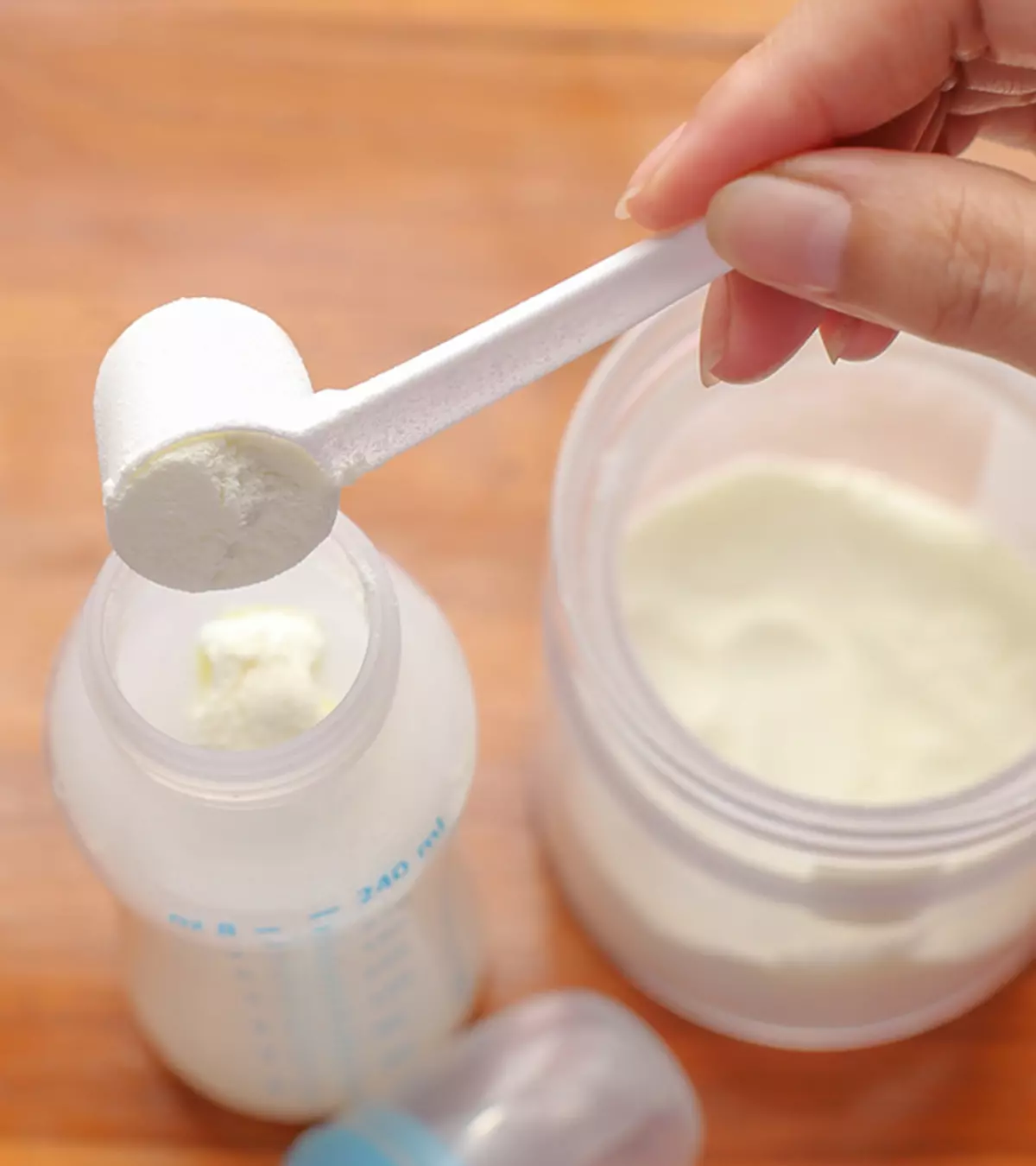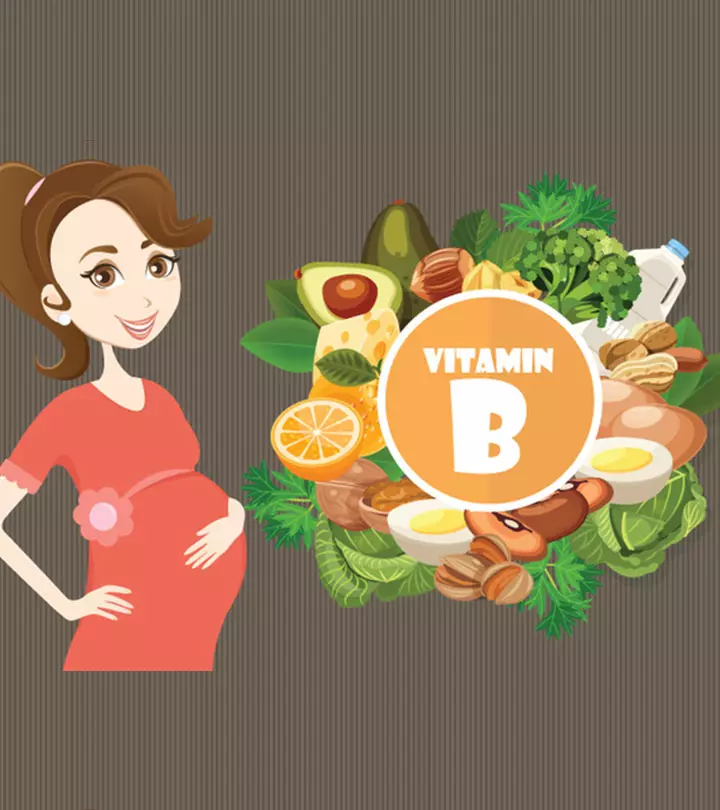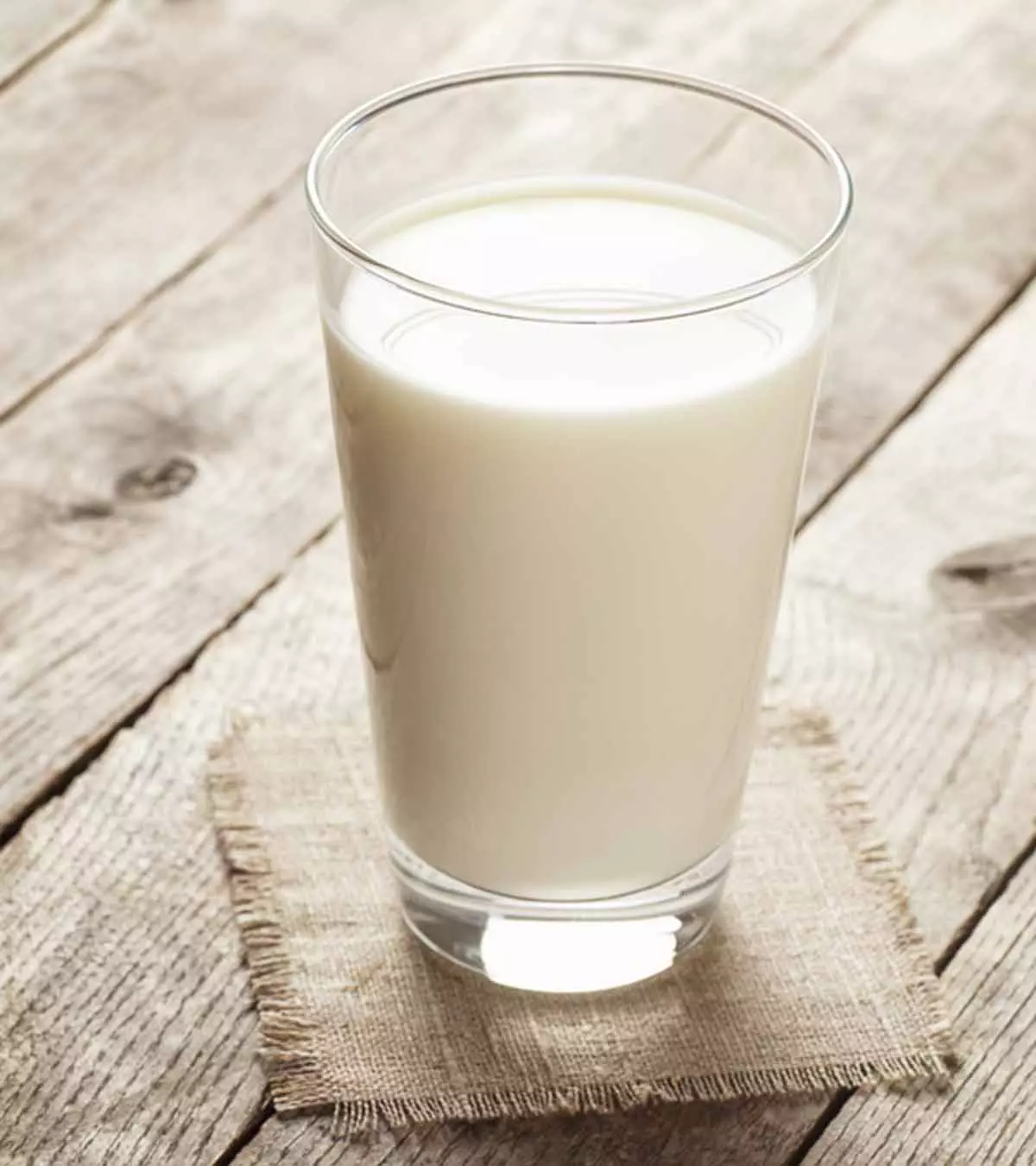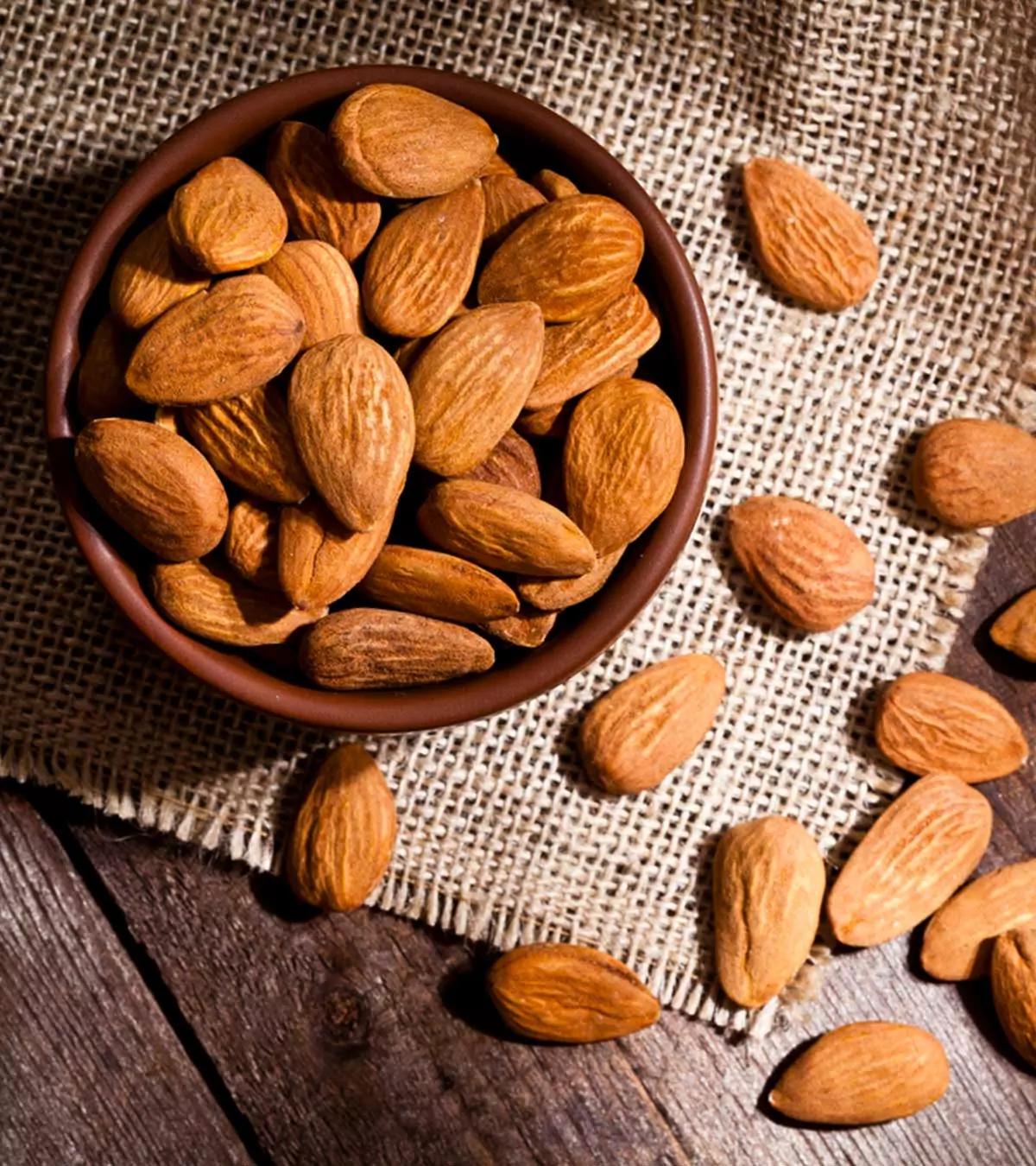
Image: iStock
You may introduce almonds for babies from six months of age if they are not allergic to them. The mildly sweet flavor of almonds can be palatable for babies. It is recommended to give almonds and other nuts in a paste or powder form for babies and younger children since they could choke on whole nuts. You can add almond paste or powder to other baby recipes, such as fruit or vegetable purees.
Read on to understand the benefits of almonds for babies, their nutritional value, possible risks, and how to add them into a baby’s diet.
Key Pointers
- Almonds can be given to babies as a paste or powder at 6 months to prevent choking
- Almonds contain MUFA, protein, fiber, biotin, and vitamin E
- Almonds can help with energy, brain health, gut health, and immunity
- Eating too many almonds can cause food allergies and stomach issues
- Consult a pediatrician before giving almonds if there is a family history of food allergies.
Is It Safe To Give Almonds To Infants?
Yes, almonds, fed in an age-appropriate way, are safe to consume for babies and toddlers. However, do not serve whole almonds to an infant since they might choke on it. Instead, feed almonds to the baby in a paste or powdered form that is easy to swallow.
Almonds can provide nutrients, such as MUFA, fiber, protein, biotin, and vitamin E (1). Besides, the dynamic phytonutrientiNatural substances found in plant-based products such as grains, fruits, and vegetables profile of the nuts offer various health benefits, which we will discuss later in the post (2).
When Can You Start Giving Almonds To Babies?
Babies above six months of age can start consuming almonds in a paste or powdered form,as part of their well-balanced weaning diet (3). Whole almonds or any other whole nuts should not be fed to children below the age of five years because they may be a choking hazard (4). According to a New York State Department of Health report, choking ranks as the fourth leading cause of unintentional death in children under five. Additionally, food-related incidents are the most common cause of nonfatal choking in young children; hence it is crucial to avoid serving whole or non-chopped nuts or almonds to babies.
Stay alert towards any sign of a nut allergy, sensitivity, or intolerance while introducing almonds to the baby. If anyone in your family has a history of food allergy or the baby has other food allergies, then consult a pediatrician before introducing almonds (5).
Soak the almonds overnight in water and either crush or grind it into a paste. Feed one-eighth of a teaspoon when introducing. Soaking helps release anti-nutrient components in the almonds.
Nutritional Value Of Almonds
Almonds have considerable amounts of carbohydrate, fat, protein, and essential nutrients that can contribute to your baby’s recommended intake. Below is the approximate nutritional composition of one ounce (28.35g) of unroasted almonds (6) (7) (8) (9).
| Name | Amount | RDA(7-12months) |
|---|---|---|
| Energy | 164Kcal | – |
| Protein | 6g | – |
| Total lipid (fat) | 14.2g | – |
| Carbohydrate, by difference | 6.11g | – |
| Fiber, total dietary | 3.54g | – |
| Calcium, Ca | 76.3mg | 270mg |
| Iron, Fe | 1.05mg | 10mg |
| Magnesium, Mg | 76.5mg | 60mg |
| Phosphorus, P | 136mg | 275mg (AI) |
| Potassium, K | 208mg | 700mg |
| Sodium, Na | 0.284mg | 200mg |
| Zinc, Zn | 0.885mg | 3mg |
| Copper, Cu | 0.292mg | 0.6-0.7mg |
| Selenium, Se | 1.16µg | 15µg |
| Vitamin E (alpha-tocopherol) | 7.27mg | 4mg |
Source: U.S. Department of Agriculture, World Health Organization, and Oregon State University*AI = Adequate intake
Breast milk is the best source of nutrition for babies up to at least 12 months of age. Along with continued breastfeeding for up to at least 12 months, adding almonds to your baby’s diet in moderate amounts can enhance the overall diet’s nutritional value.
Possible Health Benefits Of Almonds For Babies
Almond intake,as part of a weaning diet,can provide the following health benefits to a baby.
- Supply energy: Infants and toddlers need energy for growth, development, and activity (10). One ounce of almonds provides 164 Kcal of energy that can significantly contribute to an infant’s energy needs. Besides, it could give some protein necessary for growth and sustenance.
- Support gut health: Research studies indicate that apart from maintaining healthy bowels, the dietary fiber from almonds also has prebiotic effects associated with an array of health benefits, such as enhanced gut health and improved digestion. (11) (12).
- May boost brain health: Almonds are widely considered a brain power-boosting food due to the presence of vitamin E. Research indicates that the antioxidantsiSubstances that may prevent or slow down cell damage caused by harmful molecules called free radicals from almonds may protect the brain from free radicals in the body which may lead to cell damage in the long run (13).
- May develop and strengthen bones: Almonds contain a significant amount of potassium, calcium, magnesium, and phosphorus that can potentially contribute to bone development and strengthening (14) (15).
- May enhance immunity and overall health: Almonds are nutrient-dense and contain several essential micronutrients and bioactive phytochemicalsiNaturally occurring compounds in plants that provide health benefits to humans , like polyphenols. The secompounds may improve immunity and overall health through their antioxidant, anti-inflammatory, hypocholesterolemici Lowering the levels of cholesterol in the blood , and insulin-sensitivity enhancing effects, in the long run (11) (16) (17).
- Absorb vitamins: They help absorb fat soluble vitamins such as vitamin D. Vitamin D is essential for bone development.
Possible Side Effects Of Almonds For Babies
Almonds are generally safe to consume. However, just like any other food, they have their share of potential side effects.
- Gastric disturbances: Excessive consumption of almonds can cause the ingestion of high amounts of dietary fat and fiber. These may result in gastric disturbances, like indigestion, diarrhea, or stomachache in some babies.
- Allergic reactions: Some babies can be allergic to almonds on contact or consumption. Babies allergic to birch pollen can display cross-reactivity with almonds (18) (19). Check for allergy signs, such as hives, swelling of the mouth, abdominal pain, shortness of breath, etc. Discontinue feeding almonds or any product that may contain almonds and consult a doctor promptly.
 Quick fact
Quick factBabies under 12 months of age should not consume almond milk. If your baby is older than 12 months and is allergic or intolerant to cow’s milk, consult a pediatrician before considering plant-based almond milk for babies as an alternative.
Tips To Select And Store Almonds
Follow these simple tips to select and store almonds.
How to select almonds
Almonds are available in two forms.
- Shelled almonds are only the nuts with the hard, wooden shell removed.
- Unshelled almonds have the hard, wooden shell intact. You need to break the shell to get the nut inside.
Shelled almonds (without outer shell)
- Prefer sealed almonds to the ones sold in bulk bins.
- Check the packaging date to purchase fresh produce.
- If buying almonds from a bulk bin, take them from a reputable store.
- Choose almonds that are uniform in size and brown in color.
- Avoid almonds with pits, cracks, spots, and stains.
- Avoid almonds with a sharp, bitter odor that indicates rancidity.
- If buying pre-roasted almonds, prefer dry-roasted almonds without added sugar or salt to oil-roasted ones.
- Speak to the store attendant to know about the bulk bin almonds’ date of procurement and whether they have any other added ingredients.
Unshelled almonds (with the outer shell)
- Choose unshelled almonds that do not make much rattling sound when shaken. Too much rattling sound indicates that the almond is shrunken or aged.
- Check the shell carefully and ensure that they are uniform in size and do not have any cracks, stains, or holes.
How to store almonds
- Store unshelled almonds sealed in a bin or container in a cool, dark place away from heat, moisture, and air.
- For shelled and packed almonds, read the storage instructions given on the pack. Most manufacturers recommend:
- Consumption within one month of opening the package.
- The product stays sealed for freshness unless opened for use.
- Refrigerate unsealed packages for longer shelf-life.
 Quick tip
Quick tipWays To Include Almonds In Your Baby’s Diet
The following are the various ways to include almonds in a baby’s or toddler’s solid food diet. Try to give blanched (soaked and peeled) almonds.
Soak raw almonds overnight. Make a paste or grate it into a fine pulp. Combine with a saffron thread and a pinch of cardamom to further enhance the nutritional properties and flavor. Mix it with pureed foods.
- Blanched almonds can be turned into a fine almond paste or powder without any pieces or lumps in it.
- Introduce no more than half a teaspoon of paste or powder. You can add it to the baby’s cereals, porridges, and purees.
- Check for signs and symptoms of allergy/sensitivity. Follow a three-day wait rule and introduce no new food within the stipulated time.
- After the baby gets adjusted to almonds, gradually increase the amount to one teaspoon.
- For older babies and toddlers, serve almond paste or powder as part of pancakes, smoothies, and other food items.
- You can use almond flour in your baking recipes, such as cake and muffins, for a toddler.
- For toddlers, mix coarsely ground almonds with soups, salads, sandwiches, and rolls. You may use almond oil as a salad dressing or use almond milk for shakes and smoothies. Adding nut butter to their diet can be a great way to increase their protein and healthy fat intake.
A mother of twins shares her almond baby food recipe. She uses milk, raw almonds (pre-soaked, peeled and ground), and rice flour and heats the mixture to attain desired consistency. She says, “This was among one of my first foods that I gave to my babies and they truly loved it (i).”
Quick And Healthy Almond Recipes For Babies And Toddlers
Here are some easy-to-prepare and delectable almond recipes that you can try for your baby and toddler.
1. Almond and apple puree

The delicious mix of almond paste and apple puree is suitable for babies above six months.
You will need:
- 1/2 cup homemade apple puree (fresh)
- 1 cup almond (soaked and peeled)
How to:
- Put the almonds in a thick bottom food processor or blender and blend to make a fine paste. Ensure no lumps or small chunks are left.
- Mix half-teaspoon of almond paste to apple puree and serve.
- Store the remaining paste in an airtight container in the refrigerator for no more than three to four days.
 Quick tip
Quick tip2. Almond milk
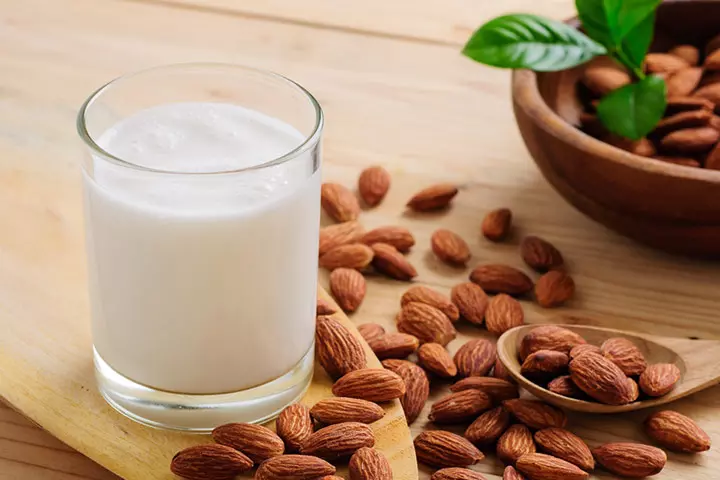
The alternative to dairy is suitable for toddlers.
You will need:
- 1 cup raw almonds (soaked overnight or two days)
- 2 cups water
How to:
- Drain and rinse the soaked almonds under cool running water.
- Put them in a blender/food processor, add water, and blend continuously for two to three minutes or until the almonds blend into opaque white water.
- Place a fine-mesh strainer or cheesecloth over a bowl and pour the almond milk over it.
- Hold the cloth or strainer firmly and press out the fine almond meal thoroughly, and squeeze out the milk.
- If you wish to add sweetener, opt for brown sugar, and serve right away.
3. Almond smoothie
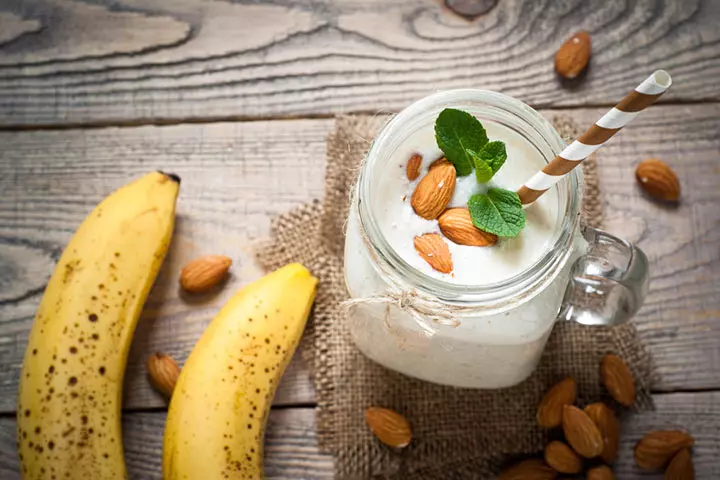
The mouth-watering and nutritious recipe is suitable for babies aged eight months and older.
You will need:
- ½ cup almonds (soaked and peeled)
- 1 cup banana (chopped)
- 1 cup Greek yogurt (unsweetened)
- 1 cup water
How to:
- Blend all the ingredients until you get a smoothie with flowy consistency.
- If needed, add water to adjust its consistency and serve immediately.
- For older babies and toddlers, add seeds and nuts powder, and serve topped with chopped fresh fruits.
4. Oats and almonds porridge

A healthy breakfast recipe for babies older than 12 months.
You will need:
- 1/4 cup rolled oats
- 1 cup whole milk
- 1/2 banana (pureed)
- 1tsp almonds powder
- 1tsp almond pieces (thinly sliced)
- 1tsp cinnamon powder
- 1tsp brown sugar (optional)
How to:
- Put a thick-bottom pan over a low flame, heat the milk, and add banana puree, almond powder, and cinnamon powder.
- After 40 seconds, add the oats with constant stirring, and cook for over two minutes.
- As milk thickens and oats look cooked, switch off the flame, and let the porridge cool.
- Transfer some porridge to a serving bowl, garnish with grated almonds, and serve while still warm.
- You can top the porridge with brown sugar and some thinly sliced fruits.
Frequently Asked Questions
1. How many almonds can a baby eat a day?
It is safe for children between the ages of one to four to consume between four to eight almonds per day in a powdered or pureed form. However, it is best to feed them a small amount to test for allergies before including any nut in their diet (20).
2. Can almonds cause constipation in babies?
Almonds are packed with fiber and other essential nutrients, making them healthy. However, any amount more than the recommended dietary portions can lead to constipation and other gastrointestinal issues in children (21) (22). Therefore, it is essential to consult a pediatrician before including them in your baby’s diet.
3. Are there any alternatives to almonds for babies who are allergic to them?
Other tree nuts can be good alternatives to almonds. However, children allergic to almonds may also be allergic to other tree nuts. According to the American Academy of Allergy, Asthma and Immunology, the decision to consume other tree nuts must not be taken lightly. Several factors influence this decision, including a thorough consultation with an allergy specialist, age, results of allergy testing, and the risk of potential cross-reactivity between the nuts (23).
4. Can giving almonds to babies help prevent allergies?
Several studies suggest that the early introduction of allergy-causing foods, such as nuts for babies, may help prevent food allergies. However, consult your child’s pediatrician before feeding your baby almonds (24).
5. Can almond oil be used topically for baby skincare?
Yes, almond oil can be used topically for baby skin care. Sweet almond oil has several clinically proven benefits. For example, it is rich in vitamins essential for healthy skin. However, consult a healthcare professional before using it to ensure its safety and efficacy for your baby (1)(25).
Almonds for babies are ideally given after six months in powdered or mashed forms. This energy-rich nut is packed with several essential nutrients such as calcium, iron, potassium, and vitamin E. Hence adding it to your baby’s diet will enhance their nutritional quotient. If your baby is 12 months or above, you could serve them almond milk or add almonds in smoothies or fruit purees. You may try feeding in small quantities to check for allergies or gastric troubles. Nonetheless, it is best to talk to your pediatrician before giving almonds to babies.
Infographic: Delicious And Healthful Ways To Feed Almonds To Babies
Rich in carbohydrates, fat, proteins, and other essential nutrients, almonds can be a good addition to a baby’s diet. However, due to its potency to be allergic, it is necessary to be cautious when introducing almonds to babies. Check out the infographic below to explore some healthful ways to include almonds in your baby’s diet. Illustration: Momjunction Design Team
Illustration: Possible Health Benefits Of Almonds (Badam) For Babies
_for_babies_illustration.jpg.webp)
Image: Stable Diffusion/MomJunction Design Team
Personal Experience: Source
MomJunction articles include first-hand experiences to provide you with better insights through real-life narratives. Here are the sources of personal accounts referenced in this article.
i. My first recipe for babyhttps://anvaritwins.blogspot.com/2011/05/my-first-recipe-for-baby.html
References
1. Almonds; Harvard T.H. Chan
2. NyoNyo Win et al.; Phytochemical, Nutritional and Antioxidant Activity Evaluation of Seeds of Almond (Terminaliacatappa L.); International Journal of Scientific and Research Publications
3. Nuts, Health, And Kids; The Australian Nutrition Foundation
4. Foods to avoid giving babies and young children; NHS UK
5. When, What, and How to Introduce Solid Foods; Centers For Disease Control And Prevention
6. Nuts, almonds; USDA
7. Feeding and nutrition of infants and young children; WHO
8. Zinc; Oregon State University
9. Phosphorus; Oregon State University
10. NutritionalNeeds; Wicworks, USDA
11. David P. Richardson et al.; The nutritional and health benefits of almonds: a healthy food choice; Researchgate
12. Prebiotic Potential Of Almonds; Science Daily
13. Repeated administration of almonds increases brain acetylcholine levels and enhances memory function in healthy rats while attenuates memory deficits in animal model of amnesia; Science Direct
14. Charles T Price et al.; Essential Nutrients for Bone Health and a Review of their Availability in the Average North American Diet; NCBI
15. Calcium and Bone Health; Help Guide
16. Alison Kamil and C.Y. Oliver Chen, Health Benefits of Almonds beyond Cholesterol Reduction; American Chemical Society
17. Can eating almonds prevent Type 2 diabetes?; Diabetes UK
18. Allergy information for: Almond (Prunus dulcis); The University Of Manchester
19. Tree Nut Allergy; American College of Allergy, Asthma & Immunology
20. INTRODUCING NUTS AT HOME –A Guide For Parents; NHS
21. The nutrition source; Harvard
22. Stopping or reducing dietary fiber intake reduces constipation and its associated symptoms; NCBI
23. Everything You Need to Know about Tree Nut Allergy;AAAA&I
24. Vitamin E and Skin Health; Oregon State University.
Community Experiences
Join the conversation and become a part of our nurturing community! Share your stories, experiences, and insights to connect with fellow parents.
Read full bio of Deepa Deshmukh
Read full bio of Swati Patwal
Read full bio of Rohit Garoo
Read full bio of Ghazia Shah













